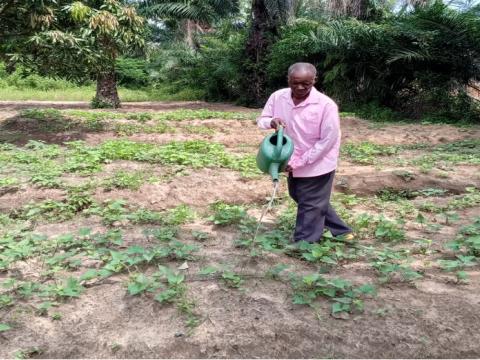DR Congo: Success Of Community Collaboration With School Feeding Program Partners In Kasai

By Pascaline Milemba, Communications Officer
Supported by the World Food Programme and implemented by World Vision, the school feeding program has already had a major impact on children and local communities in the provinces of Kasaï Central, Kasaï Oriental, and Lomami in the Democratic Republic of Congo. The program, which aims to fight food insecurity while promoting school attendance through nutritious meals for students, relies on strong collaboration with local inhabitants. The communities have demonstrated exceptional commitment, playing a key role in providing land, seeds, and agricultural tools to support the establishment of school canteens. Thanks to this collaboration, a sustainable model of local development has emerged, contributing to the continuous improvement of living conditions in the region.
Provision of Agricultural Land: A Fundamental Commitment
One of the key factors in the success of this program is the provision of agricultural land by local communities. This land is essential for growing food to supply school canteens, thus ensuring healthy, local, and nutritious meals for the children. The communities have generously offered cultivable plots, believing firmly that this act of solidarity will not only contribute to the education of their children but also to the well-being of the entire community.
"We have made our land available to grow food for the schools. This is part of our contribution to the education of our children. It is also a way for us to improve our food situation, as these fields benefit the entire community," explains Tshikwelenge, a neighborhood chief and donor of cultivable land in the Masuika health zone in Kasaï Central.
Seed Contribution: Local Support to Nourish the Future
Although the program initially planned to provide seeds through partners, logistical delays led the communities to take the initiative and supply the necessary seeds themselves. This flexibility and responsiveness helped maintain the food production pace, ensuring that the harvest schedule could be respected. This local dynamism not only prevented delays in harvesting but also strengthened the spirit of solidarity among the region's inhabitants. As Pétronie MUJINGA, a farmer in Miabi, attests:
"We used what we had in our reserves and adapted the crops to our capacities."
The communities also took matters into their own hands by temporarily providing the necessary equipment. This demonstrated their incredible adaptability and commitment to ensuring the smooth operation of the program.
"Although the tools were delivered later than expected, the communities quickly organized to continue agricultural activities. This flexibility and adaptability allowed efforts to continue despite the challenges," highlights Albert Dibondo, an agronomist in Miabi.
Challenges Turned into Opportunities
Despite the necessary adjustments to the program, the communities were able to overcome obstacles in a remarkable way. Delays in the delivery of seeds and agricultural tools, which initially caused tensions, provided an opportunity for local actors to take more initiative and increase their autonomy. This process strengthened the resilience of the communities and their ability to cooperate more closely. Additionally, although some external factors, such as the lack of adequate infrastructure, limited storage conditions for seeds and tools, and irregular rainfall, added complexity to the program's implementation, these challenges also highlighted areas for improvement for future phases. The enthusiasm and solidarity of the communities helped overcome the difficulties, and this experience laid the foundation for an even stronger model for the future.
The school feeding program continues to grow, bringing lasting benefits to children and families in the region, while illustrating the power of collective engagement and collaboration to overcome challenges.